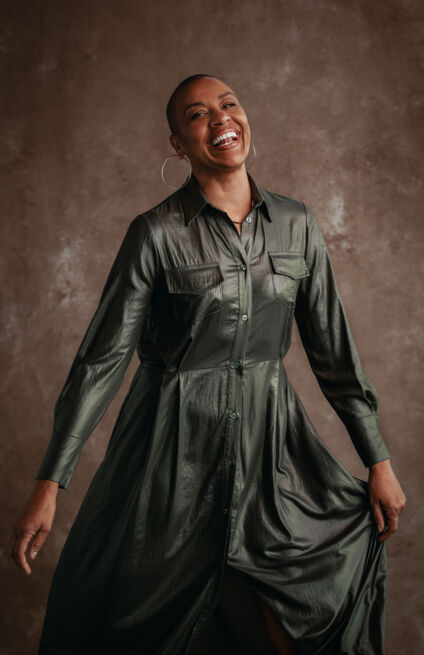Malia
Origin: Malawi
MALIA's One Grass Skirt To London is a deeply personal album that reflects her life journey from Malawi to London, told through powerful renditions of favourite songs from films that captured key moments in her life.
Line-up
Malia (vocal), Alexandre Saadaa (piano), Jean Daniel Botta (contrebasse), Laurent Sériès (batterie)

About us
With her new album, Malia presents the story of a life filled with pieces of her youth and important moments in her life. One Grass Skirt To London is a musical journey of over 8000 km, from Malawi to London, where the singer emigrated as a teenager, and a sentimental journey of 14 songs full of memories. Most of the tracks are taken from film soundtracks such as ‘Midnight Cowboy’, ‘Top Gun’, ‘Charlie and the Chocolate Factory’ and ‘Fame’; important songs for Malia that have shaped her identity and helped her to blossom as an artist.
As on the Black Orchid album, Malia is accompanied by Alexandre Saada (piano), Jean-Daniel Botta (bass) and Laurent Sériès (drums) for the instrumental part; her favourite trio who once again accompanied her in the composition of this album, and who make One Grass Skirt To London one of her most personal projects.
One Grass Skirt to London’ is an 8,200-kilometre journey from Malawi to London, where she emigrated when she was a teenager. A musical, geographical and temporal journey. But above all, it is a sentimental journey, because the 14 songs carefully chosen for this album are so precious to her because of the memories they contain.
Almost all of them are taken from a film soundtrack, from Everybody's Talking from Midnight Cowboy to Take My Breath Away from Top Gun, from Pure Imagination from Charlie and the Chocolate Factory to Here on My Own from Fame. All of them have the singular power to restore, through music and the images it conjures up, an emotion that has shaped their identity, helped them through trials and tribulations, and helped them blossom as artists.
So it's hardly surprising to hear in Malia's voice, sometimes in the same song, the little girl, the teenager, the woman, but also, as if by a fascinating act of vocal transmigration, the soul of those who are no more.
We know this interpreter of jazz that is sometimes silky, sometimes painful, capable of blending these two sensibilities in a moving cover of Billie Holiday's Solitude from the album Yellow Daffodils. We remember the magnificent tribute paid to Nina Simone in 2012 in Black Orchid, where she took on the repertoire of the impetuous American diva with authority, asserting herself as a worthy heir. But also her Convergence towards electro in a very classy album of the same name. More recently, her blues turn on The Garden of Eve, with its mix of original compositions and covers of B.B. King and Robert Johnson, was perfectly mastered. And let's not forget the extra pleasure she gives herself by picking up a few treats from the pop or RnB shelves, since one of her earliest memories of London was discovering Mars and Twix chocolate bars.
The uncompromising freedom she has acquired over the course of a career that includes several albums of varied but solid direction meant that, more than any other performer, she was destined to pick from the vast, variegated garden of film music a basket of songs with different flavours and contrasting colours. Smooth jazz, glamorous romance, electro pop, soul, ballad, music hall, gospel blues and even reggae in an astonishing version of Lee Marvin's Wander'in Star, Malia manages to reread some of the most beautiful themes in the history of cinema without detecting any conceptual intent, or the wish to retreat strategically into an exercise in style. What she captures in these 14 tracks are crucial moments in her life, intense emotions, intimate revelations gleaned in the semi-darkness of cinemas in Blantyre (Malawi), Putney in South London, or in front of the family television.
It was also through film music that she paid a touching tribute to her father in When I'm Cleaning Windows, created by George Formby for the 1936 film Keep Your Seat Please. ‘Behind each of these songs is either a memory, a personal experience or the feeling of being able to convey a part of myself. I'm aware that this album embraces different genres. But if it's meant to convey a certain image of myself, it's that of a music lover in the broadest sense of the word. When music touches me, moves me, it doesn't matter to me whether it belongs to one genre or another.
All she had to do was entrust the instrumental part to a trio made up of pianist Alexandre Saadaa, bassist Jean Daniel Botta and drummer Laurent Sériès, with whom Malia has collaborated since Black Orchid, to extract the deepest, most secret part of herself from these standards, and paradoxically make this album one of the most personal in her discography.


